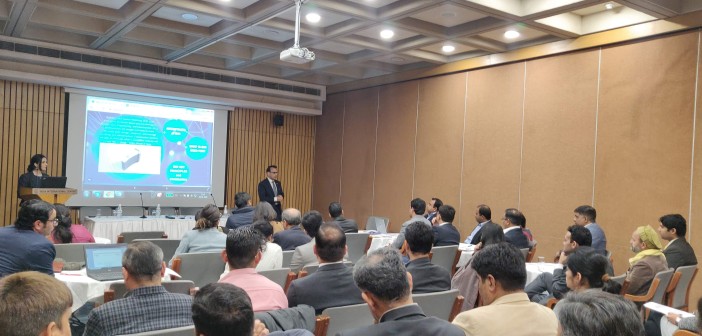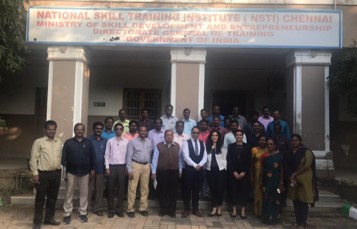Under the Skill for Job project by Department for International Development (DFID), a knowledge sharing session and a three-day master classroom was organized with an emphasis on Building Information Modeling (BIM) and new age technologies in the construction industry. These were facilitated and delivered by experts from Dudley College of Technology, UK.
The details for the knowledge sharing session and three-day master classroom are given below.
DFID’s knowledge sharing session on modern methods of construction (MMC) with an added emphasis on Building Information Modelling (BIM)
Department for International Development (DFID) organised a knowledge sharing session on modern methods of construction (MMC) in collaboration with Construction Skill Development Council of India (CSDCI) on 20th January 2020. The session emphasised on Building Information Modelling (BIM).
The workshop intended to provide a road map for construction and design specialists, skills stakeholders, academia, policy makers and practitioners who are eager to learn the requirements to operate and work in new age Architecture, Engineering and Construction (AEC) environment.
The session was facilitated and delivered by experts from Dudley College of Technology, UK. Dr. Luana Parisi, a Built Environment specialist, from the Dudley College was the lead presenter. She was well supported by Sanjeev Ohri, Chief Officer – Dudley Worldwide.
The session was inaugurated by Ms. Kaustubhi Harit, Skills Policy Lead, DFID. she elucidated the commitment of DFID in furthering new age technologies in demand driven areas of workforce for the sector. She highlighted about sector’s contribution of close to 9% to the GDP and being the second largest employer after agriculture in India; and a strong need for infusing technology in the sector. CEO, CSDCI also spoke about the need for enhanced and targeted skill training and the benefits of tech-based skill development initiatives in the sector.
The sessions led by Dr. Luana and Sanjeev outlined the fundamentals of BIM methodology and the Revit software, wherein the training sought to equip the participants with key principles and use cases around the BIM and other new age technologies. The presenters then shared the list of vocational courses that are available in the UK relating to BIM methodologies. They addressed a plethora of interesting questions from the audience, an admixture of training providers, industry associations, employers, academia from vocational to higher education institutions.
Sessions such as these allow us to understand the stakeholder view point more pertinently and help us in developing further interventions in strengthening the skills ecosystem” said Ms. Anu Gupta, Head Skills, DFID on the session emphasizing the need for more such interactions which allows deepening of technical understanding amongst the stakeholders. Sanjeev highlighted that “the evolution of BIM around the globe will enable key stakeholders to move towards a greater collaborative and integrated approach. The willingness of all the participants to take a lead on BIM was exceptionally gratifying.” The session was concluded with videos of case studies on new age technologies in the sector and summarization of UK best practices and their applicability in India.
 Three-day master classroom on Building Information Modelling (BIM)
Three-day master classroom on Building Information Modelling (BIM)
In addition to the knowledge sharing session, a three-day master classroom was organized at the National Skill Training Institute (NSTI), Chennai from 21 to 23 January 2020 in an effort to engage with long-term skill development ecosystem on new age technologies in the Architecture, Engineering and Construction (AEC) space. The classroom was curated and delivered by Dudley College of Technology, UK.
 It was the first of its kind of an initiative and it witnessed participation from over 25 trainers, faculty members from native ITIs and academic institutions and key senior practitioners from within the AEC sector in India.
It was the first of its kind of an initiative and it witnessed participation from over 25 trainers, faculty members from native ITIs and academic institutions and key senior practitioners from within the AEC sector in India.
The first day highlighted a range of new age technologies in the sector with an ideation session on the importance of technology in the skill development parlance. Dr. Luana engaged the audience with her presentation on the evolution of the tech-driven platforms and their advantages and disadvantages. This was followed up by introduction to BIM and its key principles and standards. Interfacing the developments from the UK, she also highlighted the relevance of BIM in the Indian context and possible areas to learn from the global standards.
The second day was focused on training on Revit, a leading software in designing and developing 3D-4D-5D models of proposed constructions capturing the granular details together with the involved time and cost. The final day began with a talk on SMART BIM and SMART buildings and some of the developments with regards to AR/VR, AI technologies in the construction sector.
The program ended with the participants delivering presentations on the key takeaways and discussion on areas of intervention in furthering the trainings on technology-based roles.
The session was well received by the participants and they were exposed to modern methods of construction. The program got concluded with exchange of notes on the best practices available in both the countries regarding tech-driven innovations in the AEC sector.













Comments 1